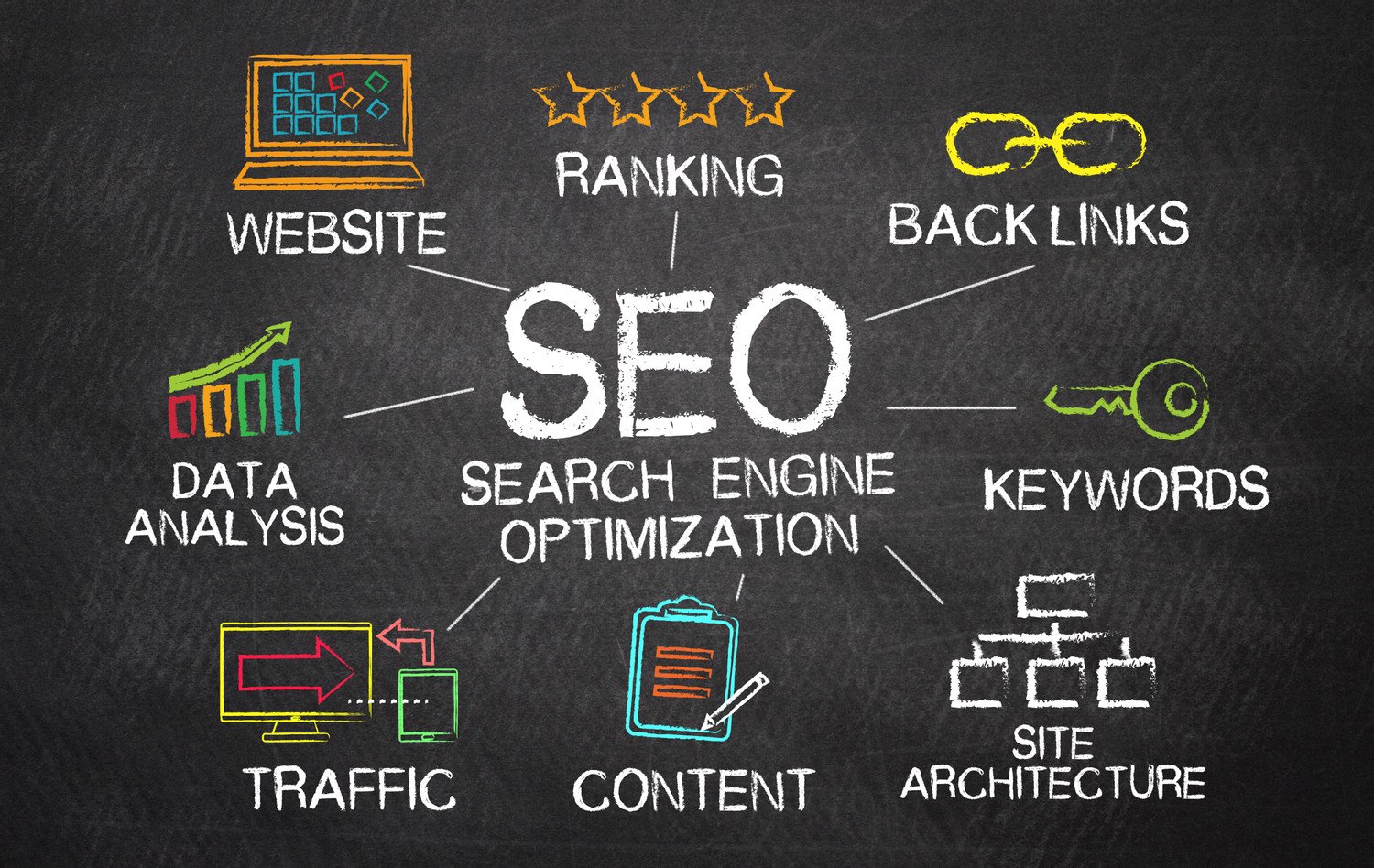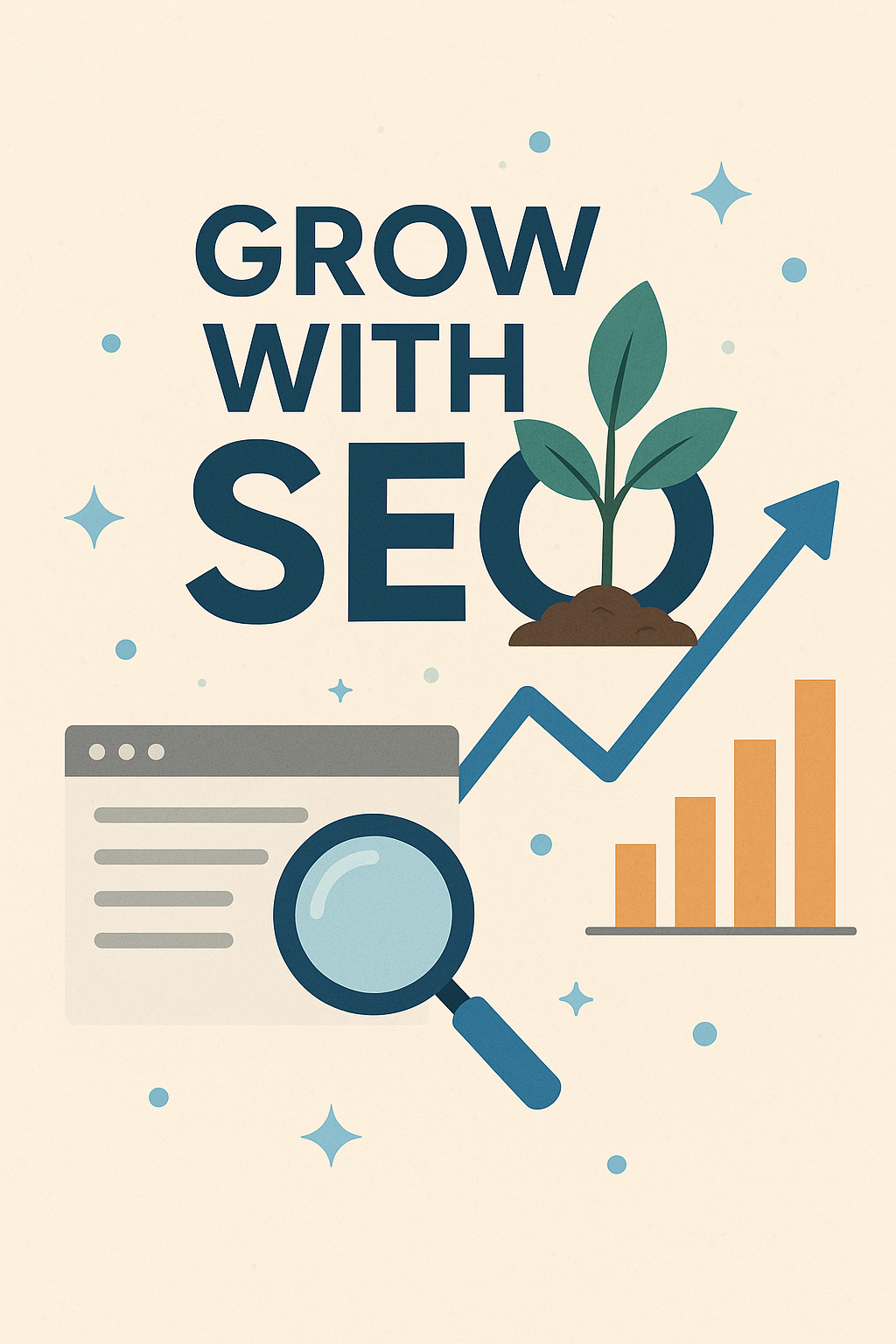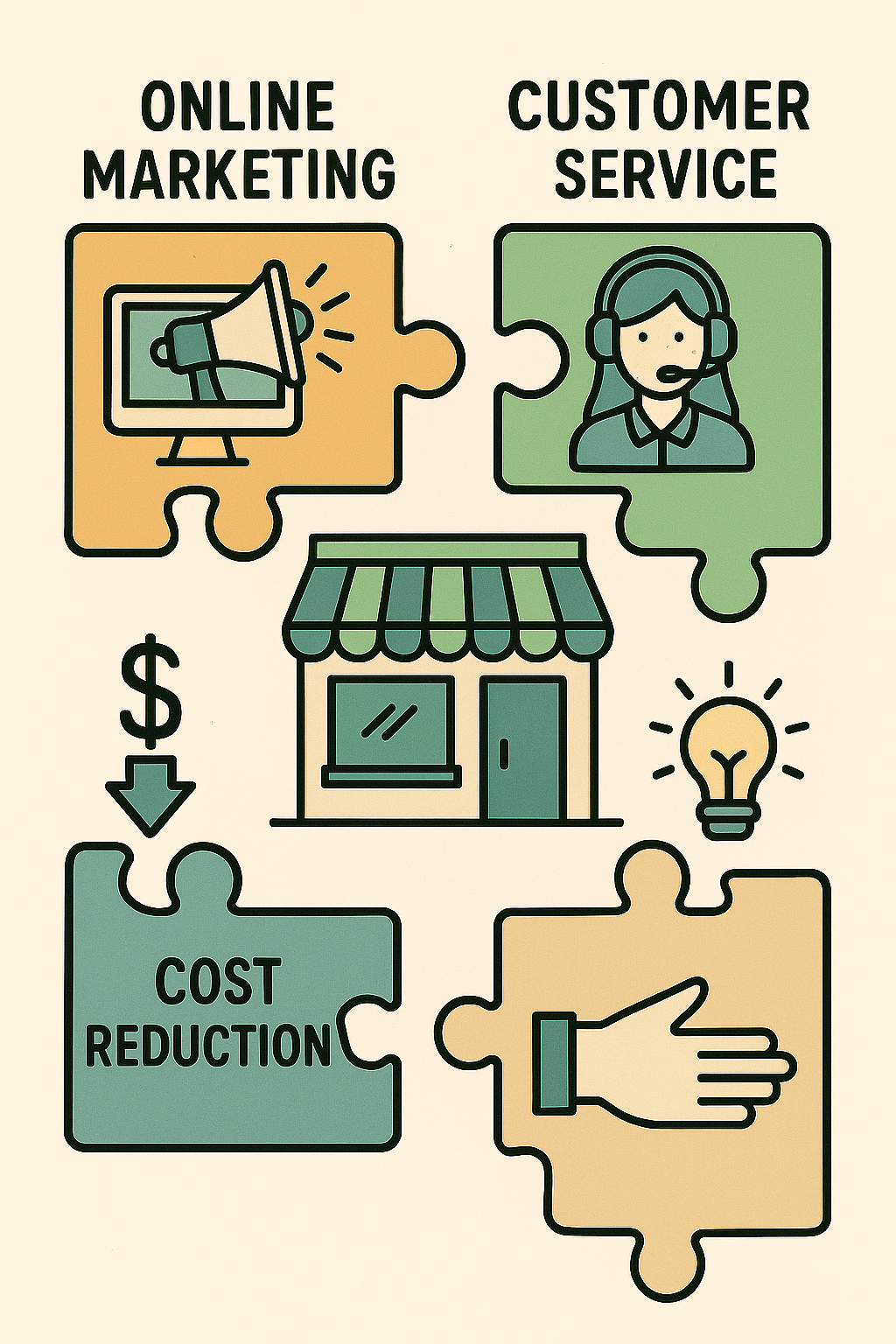SEO can help you crush the competition!

Get noticed on Google and appear on the first page.

Help local customers find you.

Use quality content to boost sales and drive leads.
SEO can help you crush the competition!

Get noticed on Google and appear on the first page.

Help local customers find you.

Use quality content to boost sales and drive leads.
OUR SERVICES
Web Designing »
Search Engine Optimization »
Pay Per Click Advertising »
Social Media Marketing »
Digital Marketing Strategy »
Conversion Rate Optimization »
CONTACT US
Get In Touch
OUR HIGHLY MOTIVATED SEO CONSULTANTS WILL HELP YOU REACH THE TOP
Reach customers locally
The latest SEO tools can give you real-time tracking to determine where users are coming from.
Stay one step ahead of others in your market
Ranking at the top of organic search results will help your website gain a competitive edge over others.
Not get lost on Google
With a website that’s fully optimized for search engines and consumers alike, you can maintain a strong presence on Google.
Access targeted customers
Whatever stage of the sales cycle your audience are at, they’ll always be able to find your site on Google.
Generate more sales, leads; generate bigger, better results!
Create high quality content to entice high quality traffic, and watch as the conversions stack up.
Enjoy improved results over time
By continually optimizing your website with the help of top digital techniques and tools, your rankings should continue to improve.
OUR SERVICES
Search Engine Optimization »
Pay Per Click Advertising »
Social Media Marketing »
Web Designing »
Conversion Rate Optimization »
Digital Marketing Strategy »
CONTACT US
Get In Touch
OUR HIGHLY MOTIVATED SEO CONSULTANTS WILL HELP YOU REACH THE TOP
Reach customers locally
The latest SEO tools can give you real-time tracking to determine where users are coming from.
Stay one step ahead of others in your market
Ranking at the top of organic search results will help your website gain a competitive edge over others.
Not get lost on Google
With a website that’s fully optimized for search engines and consumers alike, you can maintain a strong presence on Google.
Access targeted customers
Whatever stage of the sales cycle your audience are at, they’ll always be able to find your site on Google.
Generate more sales, leads; generate bigger, better results!
Create high quality content to entice high quality traffic, and watch as the conversions stack up.
Enjoy improved results over time
By continually optimizing your website with the help of top digital techniques and tools, your rankings should continue to improve.
FAQs
What is SEO?
Why is SEO important
What makes an effective SEO strategy?
-
- Keyword Research: Identify relevant keywords that users might use to find information, products, or services related to your business. These keywords will be strategically used throughout the website.
- On-Page Optimization: Incorporate selected keywords naturally into various on-page elements, including title tags, meta descriptions, headers, and content. Optimize images and multimedia for faster loading times.
- Content Creation: Develop high-quality, relevant, and engaging content that caters to the needs and interests of your target audience. Regularly update the content to keep it fresh and valuable.
- Technical SEO: Address technical aspects of the website, such as improving site speed, mobile-friendliness, and ensuring proper indexing by search engines. Use XML sitemaps to help search engines understand the structure of your site.
- Backlink Building: Acquire high-quality backlinks from reputable websites. Backlinks are like “votes of confidence” from other sites and can significantly impact your site’s authority and credibility.
- User Experience Optimization: Enhance the overall user experience by improving site navigation, ensuring mobile responsiveness, and reducing bounce rates. A positive user experience contributes to better rankings.
- Local SEO: For businesses with physical locations, optimize local SEO elements. This includes creating a Google My Business profile, acquiring local citations, and encouraging positive reviews.
- Analytics and Monitoring: Use analytics tools to monitor website performance, track user behavior, and measure the success of SEO strategies. This data informs ongoing optimization efforts.
- Social Signals: While not a direct ranking factor, social signals (activity and engagement on social media platforms) can indirectly influence SEO. Shareable content can lead to increased visibility and backlinks.
- Algorithm Updates: Stay informed about search engine algorithm updates. Major search engines like Google regularly update their algorithms to provide users with the most relevant and high-quality results. Adapt your SEO strategies accordingly.
- Authority and Trust: Build your website’s authority and trustworthiness by consistently producing valuable content, earning quality backlinks, and establishing a positive online reputation.
- Adaptation to New Technologies: As technology evolves, so do user behaviors. Adapt your SEO strategy to include optimizations for emerging trends, such as voice search and mobile-first indexing.
SEO is an ongoing process that requires monitoring, adaptation, and continuous improvement. The ultimate goal is to provide a seamless and valuable experience for users while making it easier for search engines to understand and rank your content.
How long it takes to see results with SEO?
-
- Competition: In highly competitive industries, it may take longer to see significant results compared to niche markets with less competition.
- Website History: Established websites with a history of quality content and good SEO practices may see results sooner than new websites.
- Content Quality and Freshness: High-quality, regularly updated content tends to attract search engines more quickly. Content freshness is a positive ranking factor.
- Backlink Profile: Building a healthy backlink profile takes time. The quality and quantity of backlinks contribute to your site’s authority.
- Technical Optimization: Technical SEO improvements can lead to quicker results, especially if there are issues hindering the site’s crawlability.
- Keyword Competition: Targeting less competitive keywords may yield faster results compared to highly competitive terms.
In general, it’s common to see some initial improvements within a few months, but substantial results may take six months to a year or longer. SEO is a long-term strategy, and ongoing efforts are necessary to maintain and improve rankings as algorithms evolve and competitors adjust their strategies. Regular monitoring, adaptation, and a commitment to best practices contribute to sustained success.
What Are We Deadset Good At?
Take Your Brand Higher in Search
“Be discovered where it matters most—on the first page of results.”
It’s not enough to have a website anymore. People look for businesses like yours every day, but if you don’t optimize your site, they won’t be able to find it. Digi Media Marketing is here to help. We don’t only look at rankings; we also plan to help you get the proper people to your site, keep them interested with engaging content, and turn them into loyal customers.
We are a reputable web development business in Surrey and a partner in digital growth. We combine analytics, content, and technological advancements into a plan that will help you get results. Our team ensures your firm stands out in competitive markets by doing everything from rigorous audits to making changes regularly.
Our approach includes:
- Do full-fledged audits to find ways for growth
- Strategies that are specific to your field
- On-page and off-page optimization to keep your site visible
- Reporting that is clear, so you can see how well you’re doing
Win Attention in Your Local Market
“Turn local searches into real customers.”
Most people start their searches with “near me.” People searching for businesses in your neighbourhood won’t find your brand if it doesn’t appear. That’s why local optimization is the most essential part of our work.
Digi Media Marketing makes your firm a well-known name for searches in your area. We make your Google Business Profile as good as possible, ensure your listings are the same across all directories, and write content specific to your locality that speaks directly to your target audience. What happened? More phone calls, walk-ins, and internet questions from folks who are already interested.
Local strategies that work:
- Optimizing profiles for the most exposure
- Managing reviews and reputation
- Creating community-focused material for trustworthiness
- Smart targeting for “near me” search queries
What Makes Us Different?
“Not just clicks—sustainable growth you can trust.”
It’s essential to pick the correct digital partner. Many agencies say they can get results quickly, but shortcuts don’t usually work. We at Digi Media Marketing work on making long-term plans based on ethical business methods and accurate market data.
We know that businesses want more than just traffic; they want leads, sales, and growth that they can see. That’s why people in Surrey choose us as their web development and SEO partner. We make a real difference, not simply short-term surges, by being open, testing all the time, and running campaigns that are right for each client.
Why businesses trust us:
- No hidden tricks and clear communication
- Strategies that are tailored to goals
- Regular updates to keep up with market developments
- A complete approach that includes content, design, and optimization
Comprehensive Services for Every Business
“Every business deserves an online presence that delivers.”
You can never do optimization just once. Search trends, algorithms, and how people use the internet change constantly, and so should your plan. Our services are designed to cover all aspects of optimization while still being able to change as necessary.
Here’s what we offer:
- Researching keywords and comparing your site to your competitors’ sites
- Making changes to the structure, content, and metadata on your site
- Making technical improvements to make your site faster and better at what it does
- Building links to show that your site is trustworthy and authoritative
- Creating new material that fits with your goals
- Reporting that is clear and honest so that you can be fully accountable
Our advisors create campaigns that match your business values and get results, whether you need website design, Surrey BC integration or advanced optimization.
Growth Opportunities for Small Businesses
“Compete with confidence—even against bigger players.”
Online, small businesses frequently feel like they are in the shadow of bigger ones. What is good news? Innovative solutions can make things fairer. We at Digi Media Marketing assist smaller businesses in using search engines to their advantage.
Our team of small company website designers and SEO professionals develops cheap plans that focus on high-intent keywords and audiences that are most likely to convert. We don’t waste money on big campaigns but build solutions that can grow with your business.
Key benefits for small businesses:
- Strategies that don’t break the bank and get the most return on investment
- Focus on search phrases that show strong buying intent
- Local visibility to build better community relationships
- Campaigns that grow as your business does
Let’s Build Your Success Together
“Your growth is our priority.”
SEO is more than just getting good rankings; it makes your website visible online. Digi Media Marketing is more than just an agency; it’s a partner who wants you to succeed. We’ll create a plan just for you, whether you’re a new business, a well-known brand, or an entrepreneur ready to grow. This plan will have a lasting effect.
Working with us means:
-
Plans that fit with your goals
-
A team that is proactive and keeps an eye on things
-
Proven knowledge in web development in Surrey and optimization
-
Results that can be measured and support long-term growth
FAQs
What is SEO?
Why is SEO important
What makes an effective SEO strategy?
-
- Keyword Research: Identify relevant keywords that users might use to find information, products, or services related to your business. These keywords will be strategically used throughout the website.
- On-Page Optimization: Incorporate selected keywords naturally into various on-page elements, including title tags, meta descriptions, headers, and content. Optimize images and multimedia for faster loading times.
- Content Creation: Develop high-quality, relevant, and engaging content that caters to the needs and interests of your target audience. Regularly update the content to keep it fresh and valuable.
- Technical SEO: Address technical aspects of the website, such as improving site speed, mobile-friendliness, and ensuring proper indexing by search engines. Use XML sitemaps to help search engines understand the structure of your site.
- Backlink Building: Acquire high-quality backlinks from reputable websites. Backlinks are like “votes of confidence” from other sites and can significantly impact your site’s authority and credibility.
- User Experience Optimization: Enhance the overall user experience by improving site navigation, ensuring mobile responsiveness, and reducing bounce rates. A positive user experience contributes to better rankings.
- Local SEO: For businesses with physical locations, optimize local SEO elements. This includes creating a Google My Business profile, acquiring local citations, and encouraging positive reviews.
- Analytics and Monitoring: Use analytics tools to monitor website performance, track user behavior, and measure the success of SEO strategies. This data informs ongoing optimization efforts.
- Social Signals: While not a direct ranking factor, social signals (activity and engagement on social media platforms) can indirectly influence SEO. Shareable content can lead to increased visibility and backlinks.
- Algorithm Updates: Stay informed about search engine algorithm updates. Major search engines like Google regularly update their algorithms to provide users with the most relevant and high-quality results. Adapt your SEO strategies accordingly.
- Authority and Trust: Build your website’s authority and trustworthiness by consistently producing valuable content, earning quality backlinks, and establishing a positive online reputation.
- Adaptation to New Technologies: As technology evolves, so do user behaviors. Adapt your SEO strategy to include optimizations for emerging trends, such as voice search and mobile-first indexing.
SEO is an ongoing process that requires monitoring, adaptation, and continuous improvement. The ultimate goal is to provide a seamless and valuable experience for users while making it easier for search engines to understand and rank your content.
How long it takes to see results with SEO?
-
- Competition: In highly competitive industries, it may take longer to see significant results compared to niche markets with less competition.
- Website History: Established websites with a history of quality content and good SEO practices may see results sooner than new websites.
- Content Quality and Freshness: High-quality, regularly updated content tends to attract search engines more quickly. Content freshness is a positive ranking factor.
- Backlink Profile: Building a healthy backlink profile takes time. The quality and quantity of backlinks contribute to your site’s authority.
- Technical Optimization: Technical SEO improvements can lead to quicker results, especially if there are issues hindering the site’s crawlability.
- Keyword Competition: Targeting less competitive keywords may yield faster results compared to highly competitive terms.
In general, it’s common to see some initial improvements within a few months, but substantial results may take six months to a year or longer. SEO is a long-term strategy, and ongoing efforts are necessary to maintain and improve rankings as algorithms evolve and competitors adjust their strategies. Regular monitoring, adaptation, and a commitment to best practices contribute to sustained success.
Our Client’s Says













